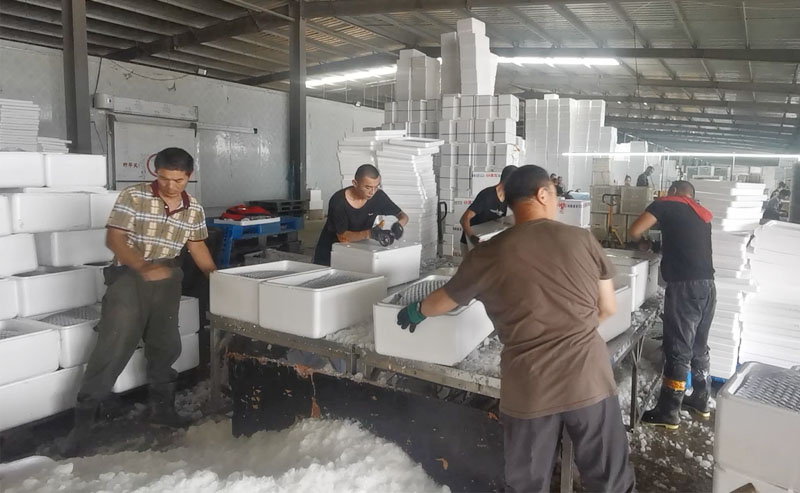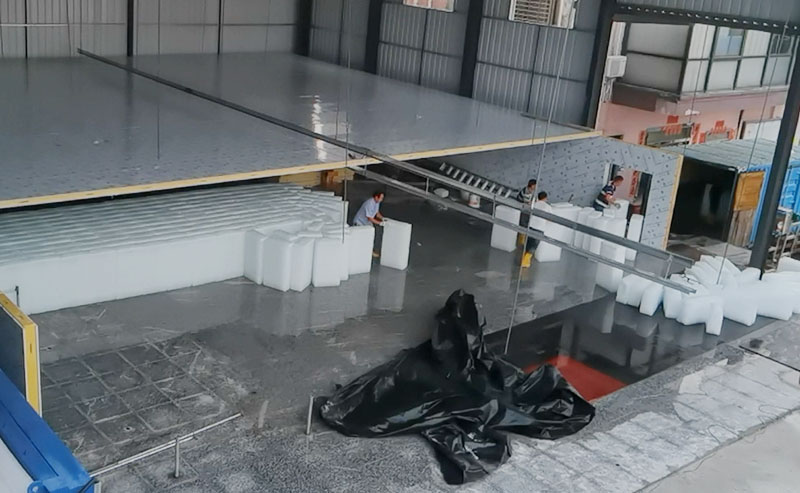 February 11, 2026
February 11, 2026


In modern agriculture, temperature control is not just a luxury—it's a necessity. The global cold chain market, integral to preserving agricultural produce, is experiencing rapid growth. At the heart of this agricultural revolution lies a simple yet powerful element: ice. Industrial ice making machines have become indispensable assets in the agricultural sector, ensuring that harvests retain their freshness, quality, and market value from field to consumer. The strategic application of specialized ice systems supports diverse agricultural operations, extending shelf life, maintaining optimal humidity levels, and significantly reducing post-harvest losses. This comprehensive guide will help agricultural professionals navigate the complex landscape of ice production technology, ensuring you select the most efficient and effective cooling solutions for your specific needs.

Different agricultural applications require specifically formatted ice to achieve optimal results. Understanding these variations is fundamental to selecting appropriate ice-making equipment.
Block ice making machines produce large, solid blocks of ice (typically weighing 5-100kg) through an indirect cooling process. These systems generally feature an ice pool, evaporator, ice bucket group frame, water filler, ice bucket crane, ice melting tank, and ice dump . The production process involves freezing water in containers immersed in a refrigerated brine solution, with the ice blocks requiring approximately 16 hours at temperatures around -24°C to fully solidify .
Once formed, these large ice blocks can be crushed into various sizes or used whole for extended cooling applications. Block ice excels in situations requiring slow, consistent melting, making it particularly valuable for:
The ice cubes produced by the tube ice making machine are hollow cylinders, and their diameter, length, and even thickness can be technically customized according to different customer needs. These systems operate by circulating water over the inner surface of evaporator tubes while refrigerant flows on the outside. The formed tube ice is released by applying hot gas to loosen it from the tube surfaces, then cut to appropriate lengths by rotating blades.
The hollow structure of tube ice provides a higher surface area-to-volume ratio compared to block ice, resulting in faster cooling capacity. This makes it particularly suitable for:
These systems boast higher evaporation temperatures (around -10°C) compared to other ice types, translating to better energy efficiency and the ability to produce substantial volumes—typically ranging from 5 to 75 tons per day .
Flake ice maker machines generate thin, flat ice pieces typically between 1.5-2mm thick. These systems employ a rotating cylinder that freezes water on its outer surface, with blades scraping the formed ice into flakes as the cylinder rotates. The unique physical properties of flake ice make it exceptionally well-suited for agricultural applications:
This format proves particularly valuable for protecting temperature-sensitive harvests like leafy greens, berries, and fresh herbs during packing and transportation.
While more common in food service applications, ice cube maker machines have found niches in agricultural settings, particularly in smaller operations or specialized processes. These systems produce individually formed cubes of consistent size and shape through either vertical or horizontal production methods.
In agricultural contexts, cube ice typically serves:

Modern agricultural operations depend on precisely timed temperature management to maintain product quality from field to consumer. The integration of industrial ice making machines into agricultural workflows has revolutionized post-harvest management, significantly extending the marketable life of perishable crops.
Ice creates a protective microclimate around produce during storage and transportation, serving dual purposes of temperature control and humidity maintenance. As demonstrated in operations like the Zhuozi County ice factory in China, the strategic application of crushed ice forms what workers call an "ice quilt" around vegetables like broccoli and lettuce during long-distance transportation . This icy blanket maintains consistently low temperatures and high humidity levels, effectively locking in moisture and freshness until products reach distant markets.
Beyond simple preservation, ice plays an active role in agricultural processing. The immediate application of ice after harvesting—a process known as field icing—rapidly removes field heat, dramatically slowing deterioration. This practice proves particularly crucial for high-respiration vegetables that quickly lose quality at ambient temperatures.
In Anshun City, China, vegetable packers strategically place 3-pound ice bottles within vegetable boxes, with usage rates reaching 20,000 ice bottles daily during peak season . This approach maintains optimal conditions throughout the distribution chain, compensating for temperature fluctuations during handling and transportation.
The strategic use of ice technologies delivers substantial economic benefits to agricultural operations. By reducing post-harvest losses, producers can significantly increase their marketable yield. Additionally, maintained product quality commands premium prices in the market and enables access to distant, higher-value markets that would otherwise be unreachable without effective temperature management.
As one vegetable shipment coordinator noted, the combination of ice bottles and cold chain transportation extends the freshness preservation period for vegetables from approximately 2 days to over 5 days —a critical extension that fundamentally changes market access possibilities for producers.
Choosing the most appropriate industrial ice making machine requires careful consideration of multiple factors specific to your agricultural operation. This decision should balance current needs with anticipated growth while maximizing efficiency and return on investment.
Begin by quantifying your ice requirements based on the volume and type of produce you handle:
Consider both your baseline needs and peak seasonal demands. As evidenced by operations in Anshun City, seasonal fluctuations can dramatically impact ice requirements, with vegetable peak harvest seasons creating unprecedented demand .
Different produce varieties benefit from specific ice formats:
When comparing industrial ice maker machines, prioritize these critical specifications:
Beyond technical specifications, factor in these operational elements:
As agricultural practices evolve to meet growing global food demands, industrial ice making machines continue to advance in efficiency, intelligence, and integration capabilities.
Future developments will likely focus on reducing the substantial energy requirements of ice production. Emerging technologies include:
The convergence of ice production with digital agriculture presents exciting possibilities:
We can anticipate increasingly tailored solutions for specific agricultural segments:
Selecting the appropriate industrial ice making machine represents a strategic decision with far-reaching implications for your agricultural operation's efficiency, profitability, and sustainability. The optimal choice balances your specific production requirements with practical operational considerations, ensuring reliable temperature management throughout your post-harvest handling processes.
As agricultural markets continue to globalize and quality standards escalate, sophisticated temperature management transitions from competitive advantage to operational necessity. The proper ice making system not only protects your current harvest but also opens doors to new market opportunities through enhanced product quality and extended shelf life.
At BAOCHARM, we understand the critical relationship between temperature management and agricultural success. Our expertise in industrial ice making solutions spans diverse agricultural applications, from small family farms to large commercial operations. We partner with you to analyze your specific needs and recommend the most efficient, reliable systems for your operation.
Ready to optimize your agricultural operation with the right ice making solution? Contact our specialist team today for a personalized consultation and system recommendation tailored to your specific crops, scale, and operational requirements.
Our Contacts
Email: sales@baocharm.com
WhatsApp: +86 17663537579
Wechat: +86 17663537579
Working Hours: Mon ~ Sat 8:30 AM - 5:30 PM